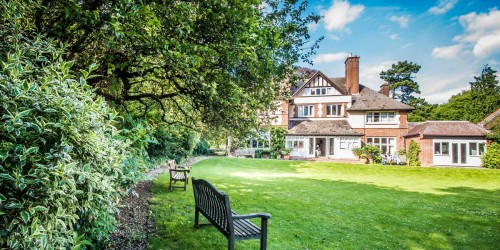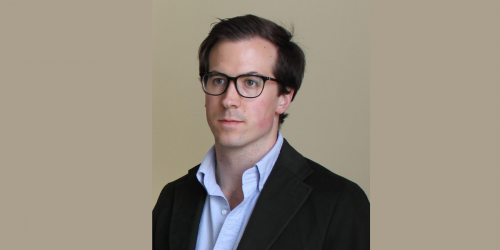
Lucy Cavendish is delighted to welcome three new members to the Fellowship
On 26 May Dr Julian Gilbey, Dr Joe Sutliff Sanders and Dr Renan Baker were appointed to the Fellowship
Dr Johnhenry Gonzalez (Hank) is a Lecturer in Caribbean History
Hank was formally admitted to the Fellowship on 27 January. In this wonderfully uplifting interview he talks about his love of exploring long-past realities, the archival thrill of discovery and his passion for teaching.
Tell us about your career as a historian. Where did your interest in history start and how did that lead to what you're doing now?
I am a historian of the Caribbean with a primary focus on the history of Haiti. I chose what I knew to be a poorly-understood country. I was driven to answer my own questions about that country’s remarkable history – the only nation-state born of slave rebellion. My work grows out of lengthy periods of research in Haiti and the Dominican Republic. I received my B.A. in history from Harvard College and my Ph.D. in history from the University of Chicago. I was a postdoctoral fellow at Duke and I worked for four years as assistant professor of Caribbean history at the University of South Florida at Tampa. My 2019 Book ‘Maroon Nation’ attempts to interpret the early decades of Haitian independence, an era widely ignored even as Haiti has become a more common historical topic of interest. My second book project now in progress considers the history of foreign influence in the twentieth-century Haitian art business. I am also currently in the early stages of my first archaeological research project in Haiti. In the history faculty my teaching on slavery and the African diaspora has generated a range of pedagogical synergies with the University’s ongoing effort to explore its own historical connections to slavery and colonialism.
What inspired you to pursue this career? What are your key motivations? What are you ultimately trying to achieve?
I was inspired to become a historian because it was always my favourite area of study. I am generally inclined to absorb and store facts and details. I also liked the exercise of trying to wrap my mind around long-past realities, and I really enjoy the archival thrill of discovery. I also imagined that study of the past was somehow a key to interpreting the present or making predictions about the future. I also like teaching and I like supervising undergrads. I think that the best thing about Cambridge’s remarkable one-on-one pedagogy is the fact that the system somehow seems to make the individual supervisor a kind of stakeholder in the student’s success. For example, I love seeing my students earn high marks and I really, really like seeing them win awards, postgraduate funding, good job opportunities, anything valuable. The sense of shared triumph is quite rewarding. Another great aspect of working at Cambridge is the very high quality of researchers who come here. The rewarding interactions range across the entire career spectrum from celebrity academic visitors, to extremely knowledgeable colleagues, to innovative new postdocs of the kind who flock to the history faculty, to the many very high-quality PhD, MPhil, and undergrad dissertations I have been privileged to advise or evaluate since coming here.
What would be your advice to students who wanted to pursue a similar career?
I have always felt some kind of natural need to take an interest in the career goals of my students. The university is an appealing environment. There are a great many people who love the academy so much that they decide they do not want to leave. We life-long university people are the ones who really took the refrain of ‘stay in school’ fully to heart. Our love of scholarship leads many of us to go to great lengths to pursue academic careers. Frankly, one of our responsibilities as faculty members is to ethically advise the many students who quickly fall in love with the university setting, and their favourite academic discipline, and who decide that they want to become academics themselves. I obviously understand the appeal. The allure of research is real. Just the other day I saw a colleague in the news discussing a major recent archaeological discovery – truly glamorous and exciting moments in the career of a researcher. Many of our students at Cambridge will go on to become professional academics. But I think that we owe it to them to warn of the kinds of challenges that they are likely to face if they pursue a career in this crowded, competitive sector. Any student of mine who chooses the academic career path does so in full awareness that this career is challenging in a variety of ways and that it often demands a significant appetite for deferred gratification.
What do you think is different or unique about Lucy Cavendish College, how did you become involved with the College and why did you want to be part of it?
I think that this is a good time for me to join Lucy Cavendish, as the college expands in multiple ways. I have plenty of excitement for working with history undergrads. I am also interested in the College’s special mission to help students from a range of backgrounds to compete and excel at this University. I take seriously a recent news item that ranked Cambridge as something like the UK’s worst university for social inclusion. I am new to Lucy Cavendish but I would not be surprised if it is one of the University’s best colleges in terms of social inclusion. In general, I have observed during almost three years at Cambridge that the institution somehow genuinely intends to reconcile ancient legacies of elitism with a growing drive to more properly include this country’s many economic, regional, ethnic and racial constituencies. I have a passion for helping those students who arrive fearing that they do not belong. I really like helping them decipher the university ecosystem. Throughout my career I have a lot of experience with first-generation students, and many different kinds of so-called ‘non-traditional’ students. I also have a fair amount of experience with programs designed to help recruit and mentor these students. I hope to use this background to serve the large, exciting new incoming cohorts of students that Lucy Cavendish is attracting.
See his Fellow’s profile here.

On 26 May Dr Julian Gilbey, Dr Joe Sutliff Sanders and Dr Renan Baker were appointed to the Fellowship

Alex, Lucy’s Fellow and Director of Studies for Part I English, shares his thoughts on life, teaching and passion for his subject